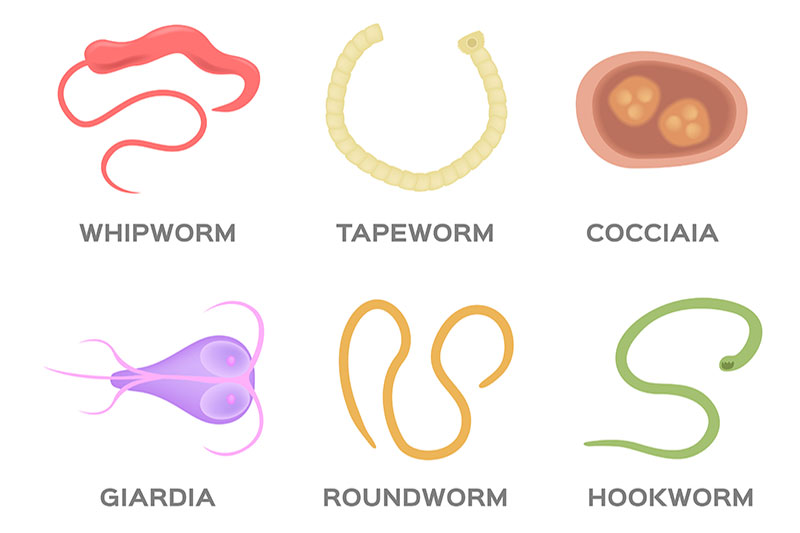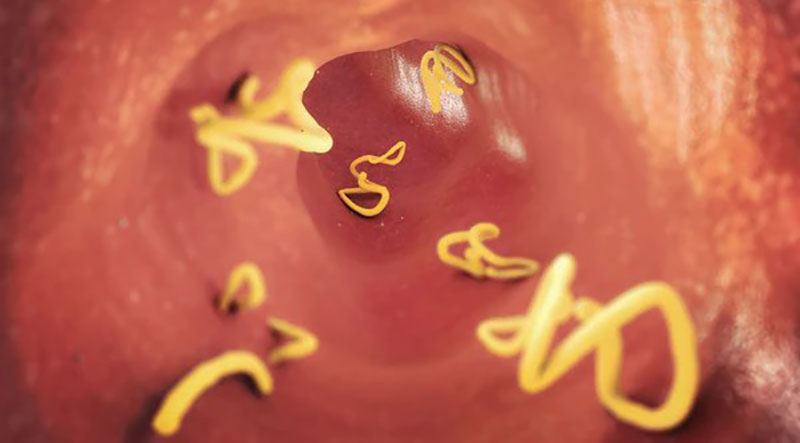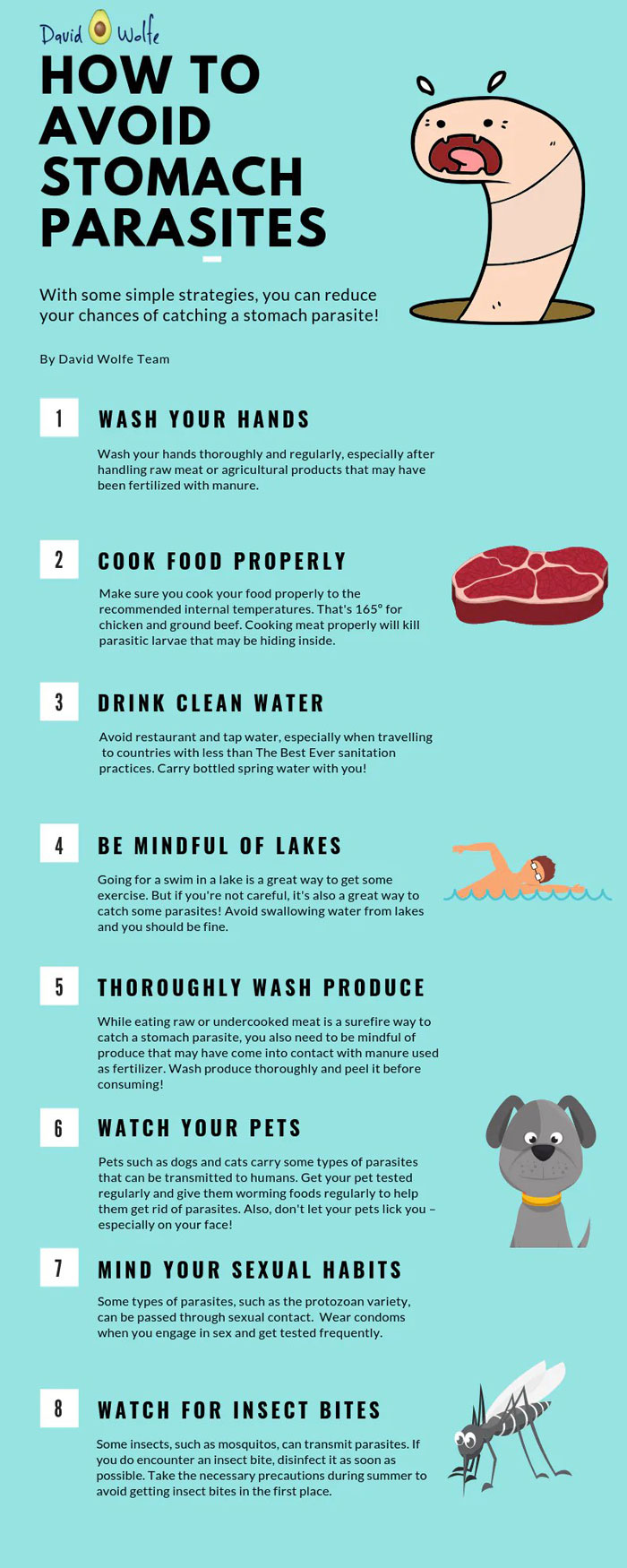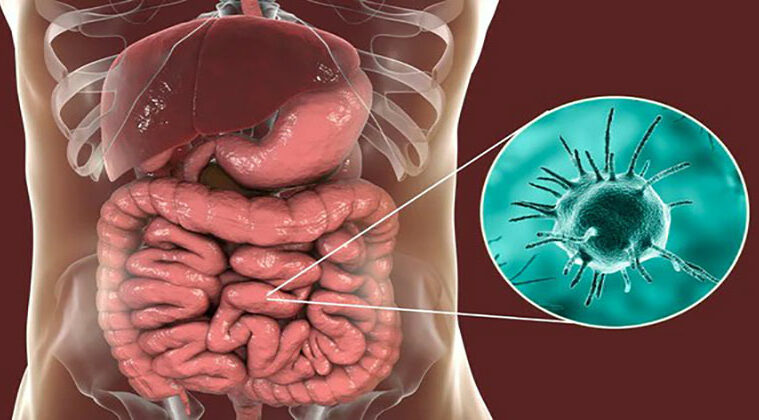You may have heard the expression, “What’s eating you?” Little did you know that there may be some truth to that question. Specifically, stomach parasites.
The thought of stomach parasites can be more than a little unnerving. It’s no surprise, then, that most people tend to not think about the topic much.
But here’s the thing. Stomach parasites don’t have to be scary when you’ve got some powerful parasite cleanse tools and knowledge at your disposal. This article will teach you everything you need to know about stomach parasites, how to tell if you have them and what to do about them.
Stomach Parasites: Do You Have Them?
If you asked most non-health conscious people about parasites, they’d probably shrug and insist it’s something that happens to other people, in other countries – but certainly not to them, in their country.
Unfortunately, parasites are not just a problem in the developing world. According to the Center for Disease Control and Prevention (CDC) Director Tom Frieden, parasites are “more common in the US than people realize.” (1)
According to the CDC, more than 60 million people in the United States have a chronic toxoplasma gandii infection. That’s just one of many stomach parasites – and it affects 60 million people in the United States alone.
Now consider the fact that there are hundreds of thousands of parasite species out there.
So, do you have parasites? To put it mildly, the odds are not in your favor.
What’s more, parasites could be to blame for your sugar cravings, which highlights the importance of doing a sugar detox.
Why Should You Care About Stomach Parasites?
Even in light of these statistics, many people may find it in themselves to shrug and say, “oh well – out of sight, out of mind” when it comes to parasites.
But the problems with parasites go well beyond the “ick” factor of having a bunch of creepy-crawlies roaming around inside you. Stomach parasites can cause serious health problems. These include:
- Digestive issues
- Fatigue
- Endless hunger
- Mood disorders like anxiety
- Yeast infections
- Itchiness around the vagina and/or anus
Unfortunately, many people on the standard Western diet (which is a major contributor to stomach parasites, as we’ll explore shortly) have become desensitized to the above health problems.
It’s often only once people do a parasite cleanse that they realize just how terrible parasites were making them feel. Luckily, this article is going to give you the skinny on how to get rid of parasites naturally.
First, though, let’s look at the types of stomach parasites so we can understand where they come from.
Types Of Stomach Parasites

We can break stomach parasites into two different categories.
The first is helminths, which are actual worms that live in your intestinal tract. They can grow up to a whopping 35 feet long and lay millions upon millions of eggs per day. (2)
Helminth parasites contribute to long-term, severe symptoms.
Then there are protozoan parasites, which are single-celled. These may not be as nasty-looking but they can cause some pretty gross immediate effects, including explosive diarrhea and severe dehydration.
Obviously, we won’t be able to cover all the different species of stomach parasites in this article. We will, however, look at the most common ones, starting with…
Amebiasis
Amebiasis, or amebic dysentery, is among the most common parasitic infections in the world. (3) In fact, according to the World Health Organization, infections transmitted from contaminated soil, such as amebiasis, are among the most common worldwide. (4)
Left untreated, amebiasis can cause a range of symptoms, from bloody diarrhea to severe ulcerative colitis. The stomach parasite can also spread to other organs – including the liver, lungs, and brain – and cause severe damage.
People in developing countries can bring amebiasis home with them if they travel to tropical areas that have other than the Best Ever sanitary conditions. In such environments, amebiasis can live in food and even ice. (5)
Even if you don’t visit a tropical area, you can still catch amebiasis if you are frequently in places with poor sanitary conditions. According to the CDC, men who have sexual intercourse are also at an increased risk of catching amebiasis.
Only about 10% to 20% of people who get infected with amebiasis show physical signs of sickness that are enough to warrant concern. Even then, it can take 2 to 4 weeks for symptoms to show themselves, by which point it may be hard to figure out exactly what is causing the illness.
A natural parasite cleanse may help you get rid of amebiasis, as well as some of the other types of parasites on this list.
Tapeworms

When most of us think of parasites, we probably think of tapeworms. Tapeworm infections can happen anywhere in the world, with some types being more common in places where people eat raw beef. (6)
Tapeworms are truly nasty creatures. Even the smallest two varieties can grow up to three meters long, while the largest variety can grow up to 10 meters.
Some types of tapeworm infections can result in cysticerosis, a serious disease that can cause seizures and eye damage. (7)
Eating improperly-cooked pork and beef, as well as visiting unsanitary places where people do not dispose of feces properly, increase your risk of developing a tapeworm infection. Your best bet here: consider a vegetarian or Mediterranean diet.
Some proponents of colon hydrotherapy believe that the practice can help clear toxins from your body that may be conducive to stomach parasites like tapeworms.
Read: How To Get Rid Of Tapeworms.
Hookworm
Hookworm infections spread through human feces that contains its eggs. Infections can happen when you walk barefoot on soil that contains hookworm-infested feces as fertilizer. You can also catch hookworm by eating unwashed produced that came into contact with contaminated soil. (8)
If the hookworm larvae enters through your skin, it can work its way into your bloodstream and lymphatic system. From there, it ends up in your lungs, where you can cough them up and ingest them properly.
Once you’ve ingested the hookworm larvae (which can also happen if you eat produce contaminated by it), the grown worms will attach themselves to your intestines. The worms will then drain nutrients from your blood, which can cause anemia in some people.
Hookworms can live up to two years and release thousands of eggs inside you.
Following a colon cleanse protocol can help you get rid of toxins that make your intestines a safe haven for icky parasites.
Whipworm
Whipworm is the last of the helminth-style stomach parasites we’ll be exploring here.
The CDC estimates that as many as 785 million people around the world have whipworm infections, representing a major burden on health systems worldwide. (9)
Whipworm is another stomach parasite that thrives in contaminated soil. Patients come into contact with whipworm by either handling the contaminated soil itself or consuming produce that was grown in that soil.
Whipworm can cause anemia, painful and bloody stools, as well as rectal prolapse, which is when the rectum loses its attachment to your insides and turns “inside out,” which is every bit as unpleasant as it sounds.

Protozoan Parasites
As mentioned earlier, protozoan parasites are not worms but rather single-celled organisms. Protozoan parasites that are infectious to humans include these: (10)
- Sarcodina
- Mastigophora
- Ciliophora
- Sporozoa
- Giardia
You can become infected with a protozoan parasite by way of contact with human feces or a mosquito bite.
While helminth parasites cause long-lasting, potentially life-shortening side effects, protozoan parasites cause immediate effects, including the following: (11)
- Watery, very foul smelling explosive diarrhea
- Abdominal cramps
- Flatulence
- Nausea
- Weight loss
Stomach Parasites: How To Get Rid Of Them
While stomach parasites can cause significant damage to your health, the good news is that you can also treat them fairly easily.
If you suspect you might have parasites (and, truth be told, statistics indicate that at least some of you reading this do), begin by ensuring you’re following some habits that will prevent more of the buggers from making a home in your body.
Here are some habits to include day-to-day: (12)
- Avoiding raw fish (yes, that includes sushi!)
- Thoroughly cook any meat (better yet, avoid meat
- Keep your pets pest-free and don’t get pet kisses
- Wash and peel all produce before eating it
- Walking barefoot is great for grounding but may lead to parasites
You also need to be very careful while travelling to tropical or developing regions. Only eat food from trusted sources with proper sanitation regulations. Also avoid contact with soil that may have been fertilized with human feces.

Sometimes prevention can only get you so far. That’s when you need to do a parasite cleanse like the one you’ll find in our Shop.
The Remove Unwanted Guests Parasite Cleanse is made with a proprietary herbal blend. Powerful anti-parasitic herbs you’ll find in the blend include cloves, black walnut, wormwood, milk thistle seed extract, chanca piedra extract, and more.
Fair warning – some people have sent us some really shocking descriptions of what’s come out of them after they used the Remove Unwanted Guests Formula.
Beyond a parasite cleanse, you can also look at drinking more detox tea. A good detox tea protocol will help you maintain a healthy gut microbiome that is less conducive to parasites.
What happens when those parasites travel from your gut to your brain? Here’s a hint:
Conclusion
Parasites are incredibly prevalent problem, not just in developing countries but in first world nations as well.
Recognizing the different types of parasites, and how they enter your body, can go a long way towards helping you steer clear of them.
If you suspect you may have stomach parasites (and chances are you do), a good parasite cleanse protocol combined with prevention strategies can leave you surprised at what comes – and hopefully stays – out of you!


